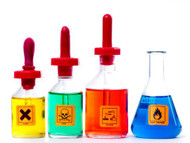Chemicals in Skincare
Posted by Courtney Henslee on Jan 12th 2019
What about chemicals?
I've been monitoring the change in skincare ingredients so closely for the past 10 years and I am constantly shocked as what passes as "natural". It's nearly heartbreaking as I have a stream of clients who come in and say, "but I spent $80 on this makeup and it came from a place that claims to only sell safe things."
I dutifully pull up the ingredients list and show them the dimethicone, silicone, and copolymers (both are forms of plastic) and then of course the myriad of preservatives they are using daily. They are always angry to see that they've been duped by brands that seem trustworthy.
It's up to us to look out for ourselves at this point. While it's true that not all long-named unpronouncable ingredients are dangerous, they're also usually just unneeded.
It is not true that we *have* to have those ingredients to be safe.
What I've been watching is even companies that were around when I was a kid have dramatically changed their ingredients and moved toward this dangerous and at-the-least irritating ingredient list. It's a sad progression to watch. I ask myself if they are doing it because of increasing their bottom line or if they are doing it because people have different expectations about the feel and viscosity of products.
For one, all this talk of products that "fill in" fine lines and wrinkles is a big red flag. No natural product sits in those lines and "fills" them. That's where the plastics come in. So a move toward an unrealistic non-aging standard of beauty has put us all at risk. Which reminds me of how women are also expected to foot the bill with our bodies with a myriad of chemical birth controls, surgery for tubes tied, and other things we put our bodies through in order to be what is expected of us.
The other problem is that these ingredients are only aging the skin further, so people have to use them more and more to gain the look they were expecting back at the beginning of using the product. So we end up in a vicious cycle that has us buying more and more of what they are selling. The addiction to foundation is so real because we look in the mirror and *only* see the imperfections.
What I know about this shift is that it's up to us to make the market change. We have got to have higher expectations of the companies that claim to care for us. It's just so damn unfortunate that they need to be told that you care about yourself. That you reached for their product out of trust and sensibility, and were lied to.
Of course, all of these ingredients are listed as "safe" largely. But I can tell you what kind of havoc I watch them wreak on my clients' skin. And just like the campaign to not put tiny abrasive plastics in skincare because it kills aquatic life, what about the millions of products with dimethicone, silicone, and copolymers (PVC based plastic) ending up in our lakes, streams, and oceans. How long before we hear about that? Not until it's too late is always the answer.
It's just so hard for me to understand how we are moving TOWARD unsafe ingredients as the market is actually asking for natural, safe, organic. But because the word natural has no industry definition, literally anyone can emblazen then product with the word. Because "safe" means it was tested for just a few weeks and the industry assumes most things are not absorbed through the skin barrier - it's all deemed safe.
But I want safety at a deeper level.
I want natural to mean it literally was taken from the plant in its whole complete form. While companies can list a chemical ingredient and then tell you innocuously that it came from coconut, they're not telling you that to separate it out of the coconut they had to used formaldehyde or hexane. Then they also had to further chemically modify to get that molecular structure. That crap didn't just fall out of coconuts and jump into your shampoo, lotion, or makeup.
Take a look at the bottles of everything you have. Ask yourself about the possible risks to not just you, but the rest of the world and what it could do years later. Is a few hours of wrinkles or acne being covered up worth it in the long run (plus your actually exacerbating the very issues your covering so you'll have to use more tomorrow)?
Get down to the nitty gritty with yourself and find a skincare maker that thinks about these things as a whole and isn't just here for profit. We do all need profit to survive, sure. But some of us are unwilling to put profit over people.
Much love,
Courtney

